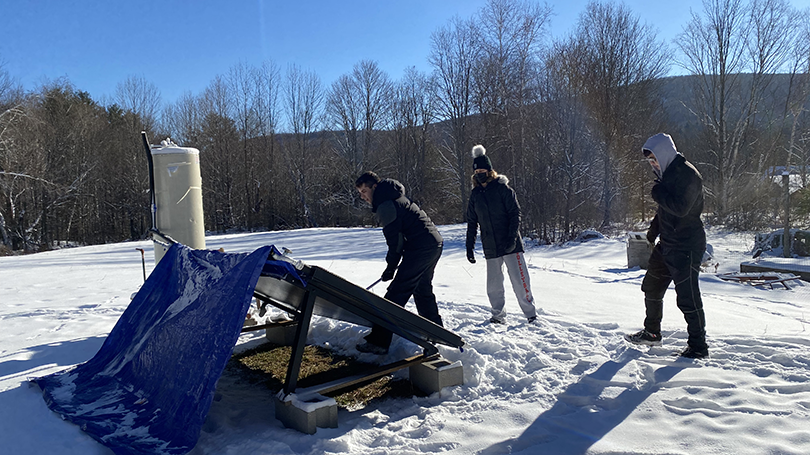
- About
- Education
- Research
- Engagement & Collaboration
- News & Events
Back to Top Nav
Back to Top Nav
Back to Top Nav
Back to Top Nav
A Dartmouth Humanitarian Engineering project group led by Noah Daniel '22 and Ethan Aulwes '22 (with participation by a range of students including Hayden Barry '25, Abigail Brazil '21, Isaac Hanover '22, Anna Hugney '24, Grace Mensi '24, Rujuta Pandit '24, and Veronica Yarovinsky '24) has spent the better part of the last year prototyping a solar water heater that, if successfully implemented, aims to help school kitchens in Uganda — and potentially throughout sub-Saharan Africa — save money, improve health, and reduce carbon output.
The project, which received Irving Institute mini-grant funding support for its initial work, collaborated with the Beacon of Hope STEM school in Uganda as a case study to develop a proposed solution to the school's reliance on firewood to heat water for cooking. In addition to being expensive, firewood use for institutional kitchens contributes to widespread deforestation in the country, creates deleterious health impacts from smoke exposure, and requires a lot of time.
The team sought to develop a solution that was economically viable, non-disruptive to traditional cooking processes, durable, locally sourced, and safe. A key consideration for the school, Noah learned in Zoom conversations with school's headmaster, was that materials needed to be locally sourced and maintainable by school personnel. The team's proposal? A solar water heater utilizing flat solar plates and two tanks. One tank contains the water being heated by the panels over the course of the day and the other contains water that has been pre-heated the previous day. "If water is solar heated the day before and stored in an insulated tank, hot water approaching boiling temperatures can be accessible the next day," they explain. "Subsequently, immediate access to pre-heated water can reduce the amount of firewood used to raise the temperature of water from ambient to boiling."
The team constructed a prototype of the solar heater and set it up outside the New Hampshire home of Irving Institute Senior Advisor Stephen Doig, who has been offering technical support for the students as they refined their design. Dr. Doig notes that it was "13° F when the students arrived [to test the heater] and never got above 17° F. So they were testing a system for equatorial Africa in Arctic conditions. They got the water temperature up to 125° F!"
The team notes that this solution won't completely eliminate the need for firewood, but that previous attempts to create carbon-free cooking solutions have been impractical. "A system designed to displace all firewood must be capable of frying, baking, boiling, and simmering food. This has proved remarkably challenging to engineer. However, a system specializing in preheating water for boil is still capable of reducing nearly 50% of total firewood consumption for target institutions." The team says, "a 50% reduction in wood is far better than a non-practical device that ultimately displaces nothing."
While challenges from the ongoing pandemic have complicated the team's collaboration with the Beacon of Hope School, a connection with another school, Uganda Christian University (UCU), was made via Dartmouth alum Richard Ranger '74 and the Irving Institute. Noah says that they plan to travel to Uganda soon to test the heater at UCU and if successful, they hope to develop an affordable, accessible business model that will allow the system to be set up in industrial kitchens across the country.